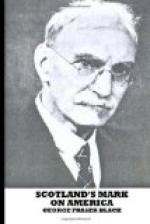by James Peale. General Hugh Mercer (c. 1725-1777),
born in Aberdeen, died of wounds received at the battle
of Princeton, also served with distinction in the
Braddock and Forbes campaigns in western Pennsylvania.
His life was a strenuous one, full of exacting and
unselfish work for others, and as Judge Goolrick says
in his “Life of Mercer,” he “is entitled
to the gratitude of all liberty-loving America.”
Mercer county, New Jersey, was named in his honor.
John Armstrong (1725-95), born in the North of Ireland
of Scottish ancestry, served in the French and Indian
War (1755-56), was Brigadier-General in the Continental
Army (1776-77), and Delegate to the Continental Congress
(1778-80, 1787-88). Colonel James Livingston
(1747-1832), by his timely shot drove the British warship
“Vulture” from her anchorage in the North
River “thus securing the capture of Andre, effecting
the discomfiture of Arnold’s treason, and assuring
the safety of West Point, the key of the Revolution.”
James Chrystie (1750-1807), born in or near Edinburgh,
joined the Revolutionary Army and served with high
reputation till the end of the war. On the discovery
of Arnold’s plot at West Point he was entrusted
with a delicate mission by Washington, which he executed
successfully. His son, Lieutenant-Colonel James
Chrystie, earned a name for himself at the Battle
of Queenstown in the war of 1812. William Davidson
(1746-1781), born in Pennsylvania of Scottish parentage
or descent, was a Brigadier-General in the Revolutionary
Army, and was killed in the fight at the ford over
Catawba River, January 31, 1781. Congress voted
five hundred dollars for a monument to his memory,
and Davidson College, North Carolina, is named in
his honor. General William Macpherson (1756-1813),
born in Philadelphia of Scottish parents, was in the
British service at the time of the Revolution, but
resigned and joined the colonies, and served faithfully
under Washington. Major Robert Kirkwood was killed
in the battle against the Miami Indians in 1792, the
thirty-third time he had risked his life for his country.
Lachlan McIntosh (1727-1806), of the family of MacIntosh
of Borlum, was born in Badenoch, Inverness-shire,
and came to America with his father who settled in
Georgia. He volunteered his services on the outbreak
of the Revolution, becoming General in 1776. He
was second in command at Savannah and took part in
the defence of Charleston. McIntosh county, Georgia,
is named after his family, “whose members have
illustrated the state, in both field and forum, since
the days of Oglethorpe.” William Moultrie
(1731-1805), born in England or South Carolina, son
of the Scottish physician, Dr. John Moultrie, ancestor
of the Moultries of South Carolina, repulsed the attack
on Sullivan’s Island in 1776 and defended Charleston
in 1779. Fort Moultrie was named in his honor.
Andrew Pickens (1739-1817), of Scottish parentage,
was noted as a partizan commander in South Carolina
(1779-81), served with distinction at Cowpens in 1781,




